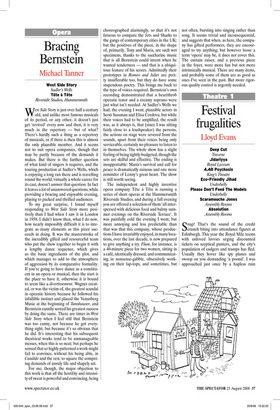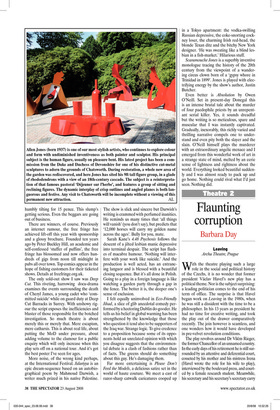Festival frugalities
Lloyd Evans
Deep Cut Traverse Jidariyya Royal Lyceum 4.48 Psychosis King’s Theatre Eco-Friendly Jihad Underbelly Please Don’t Feed The Models Underbelly Scaramouche Jones Assembly Rooms Absolution Assembly Rooms
Snap! That’s the sound of the credit crunch biting into attendance figures at Edinburgh. This year the Royal Mile teems with unloved luvvies urging discounted tickets on sceptical punters, and the city’s population of cadgers and tramps has fled. Usually they hover like spy planes and swoop on you demanding ‘a poond’. I was approached just once by a hapless ruin humbly tilting for 15 pence. This slump’s getting serious. Even the beggars are going out of business.
There are winners, of course. Previously an internet rumour, the free fringe has achieved lift-off this year with sponsorship and a glossy brochure. Founded ten years ago by Peter Buckley Hill, an academic and self-confessed ‘stuffer of puffins’, the free fringe has blossomed and now offers hundreds of gigs from noon till midnight in pubs all over town. Top comics appear in the hope of fishing customers for their ticketed shows. Details at freefringe.org.uk.
The only sold-out show I saw was Deep Cut. This riveting, harrowing docu-drama examines the events surrounding the death of Cheryl James, a young cadet who ‘committed suicide’ while on guard duty at Deep Cut Barracks in Surrey. With unshowy rigour the script exposes the inefficiencies and bluster of those responsible for the botched investigation. So much theatre is about merely this or merely that. Mere escapism, mere catharsis. This is about real life, about putting the MoD under pressure, about adding volume to the clamour for a public enquiry which will only increase when this play sets off on a national tour. And it’s got the best poster I’ve seen for ages.
More noise, of the wrong kind perhaps, at the International Festival. Jidariyya is an epic dream-sequence based on an autobiographical poem by Mahmoud Darwish, a writer much prized in his native Palestine. The show is slick and sincere but Darwish’s writing is crammed with perfumed inanities. He reminds us many times that ‘all things will vanish’ (you don’t say), but predicts that ‘12,000 horses will carry my golden name across the ages’. Bully for you, mate.
Sarah Kane’s 4.48 Psychosis follows the descent of a jilted lesbian manic depressive into terminal despair. The script has flashes of macabre humour. ‘Nothing will interfere with your work like suicide.’ And the production is well acted, has an entrancing languor and is blessed with a beautiful closing sequence. But it’s all done in Polish. Going to a play in a foreign language is like watching a garden party through a gap in the fence. The better it is, the deeper one’s sense of exclusion.
I felt equally uninvolved in Eco-Friendly Jihad, a slice of glib anecdotal comedy performed by a hectoring Dublin do-gooder. He tells us his belief in global warming has been strengthened by the knowledge that those who question it tend also to be supporters of the Iraq war. Strange logic. To give credence to a proposition because some of its opponents hold an unrelated opinion with which you disagree suggests that the environmental debate is a clash of fashions rather than of facts. The greens should do something about this guy. He’s damaging them.
Far more entertaining is Please Don’t Feed the Models, a delicious satire set in the world of haute couture. We meet a cast of razor-sharp catwalk caricatures cooped up in a Tokyo apartment: the vodka-swilling Russian depressive, the coke-snorting cockney loser, the charming Irish red-head, the blonde Texan ditz and the bitchy New York designer. ‘He was sweating like a blind lesbian in a fish-market.’ Hilarious stuff.
Scaramouche Jones is a superbly inventive monologue tracing the history of the 20th century from the viewpoint of a wandering circus clown born of a ‘gypsy whore in Trinidad in 1899’. Jones is played with electrifying energy by the show’s author, Justin Butcher.
Even better is Absolution by Owen O’Neill. Set in present-day Donegal this is an intense brutal tale about the murder of four paedophile priests by an unrepentant serial killer. Yes, it sounds dreadful but the writing is so meticulous, spare and muscular that I was instantly captivated. Gradually, inexorably, this richly varied and thrilling narrative compels one to understand and even pity both the slayer and the slain. O’Neill himself plays the murderer with an extraordinary angelic menace and I emerged from this wonderful work of art in a strange state of mind, melted by an eerie sense of lightness and rightness about the world. Everything looked beautiful suddenly and I was almost ready to pack up and go home. Nothing could rival what I’d just seen. Nothing did.



























































 Previous page
Previous page